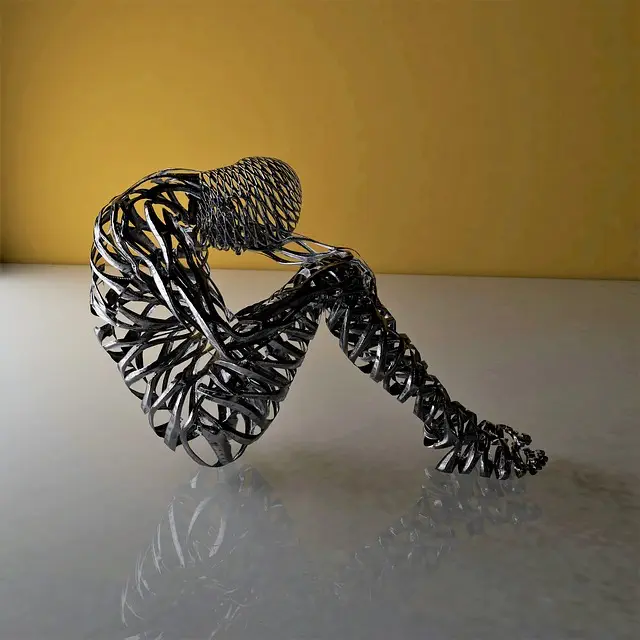Managing anxiety disorders often requires a comprehensive strategy that combines professional therapy, community support, and in some cases, natural supplements like Kratom. Professional interventions, such as cognitive-behavioral therapy (CBT) and exposure therapy, are tailored to address the underlying causes of anxiety and guide recovery. At the same time, community resources offer peer support groups and workshops that provide valuable coping strategies and a supportive network for sharing experiences. Kratom, derived from the Mitragyna speciosa tree, has been observed for its potential anxiolytic and muscle-relaxing properties due to its interaction with opioid receptors. While Kratom may offer relief from anxiety and muscular tension, it is imperative to consult healthcare professionals given its complex legal status and potential side effects. A balanced approach that integrates these medical interventions with community support and the careful consideration of alternatives like Kratom can offer a multifaceted and effective treatment plan for individuals with anxiety disorders.
Anxiety disorders profoundly impact the daily lives of millions, with a multitude seeking effective coping strategies. This article delves into the therapeutic potential of Kratom in managing these conditions, particularly focusing on its effects on anxiety and muscle tension. We explore how integrating Kratom with holistic relaxation techniques can offer a comprehensive approach to support overall well-being. Additionally, we navigate available community resources and therapy options, emphasizing the role of Kratom in promoting muscle relaxation as part of an individual’s support system against anxiety.
- Understanding Anxiety Disorders: The Role of Kratom in Managing Anxiety and Muscle Tension
- Holistic Approaches to Anxiety Management: Integrating Kratom with Relaxation Techniques for Optimal Support
- Navigating Support Systems: Community Resources, Therapy, and the Use of Kratom for Anxiety and Muscle Relaxation
Understanding Anxiety Disorders: The Role of Kratom in Managing Anxiety and Muscle Tension
Anxiety disorders represent a spectrum of mental health conditions characterized by excessive worry, nervousness, and fear that can interfere with daily life. A deep comprehension of these disorders is crucial for effective support and management strategies. Among various therapeutic approaches, the use of Kratom has garnered attention due to its potential benefits in managing anxiety and associated muscle tension. Kratom, a plant-based substance derived from the leaves of Mitragyna speciosa, has been traditionally used in certain cultures for its stimulating or sedative effects, depending on the dose ingested. Its alkaloid composition, particularly mitraphylline and 7-hydroxymitragynine, is believed to interact with the brain’s receptors, potentially leading to analgesic and anxiolytic properties, which can be instrumental in alleviating muscle tension often experienced by individuals with anxiety disorders.
The role of Kratom in managing muscle relaxation is a subject of ongoing research, as it may offer a natural alternative to conventional pharmaceuticals. Users report a sense of calm and relief from physical discomfort, which could be beneficial for those suffering from anxiety-induced muscle tightness or chronic pain. However, it’s important to approach the use of Kratom with caution, as its effects can vary significantly among individuals, and it carries potential side effects and risks of dependence when used in high doses or over prolonged periods. Therefore, any consideration of incorporating Kratom into an anxiety management plan should be done under professional guidance, ensuring that it complements other evidence-based treatments and supports a holistic approach to well-being.
Holistic Approaches to Anxiety Management: Integrating Kratom with Relaxation Techniques for Optimal Support
Managing anxiety often requires a multifaceted approach that addresses the physical, mental, and emotional aspects of the condition. In this context, Kratom has emerged as a potential supportive tool within holistic anxiety management strategies. Kratom, derived from the leaves of Mitragyna speciosa, is known for its various effects on the body, including its ability to induce muscle relaxation and alleviate stress. This natural compound can be particularly beneficial when integrated with relaxation techniques such as progressive muscle relaxation (PMR). PMR involves tensing and then relaxing different muscle groups in the body, which can help individuals become more aware of what relaxed muscles feel like. When combined with Kratom’s soothing properties, the efficacy of PMR can be enhanced, leading to a more profound state of calm and reduced anxiety levels.
It is important for individuals considering the use of Kratom as part of their anxiety management plan to consult healthcare professionals first. This is crucial due to the potential for interactions with other medications and the varying effects Kratom can have depending on dosage and individual physiology. Additionally, relaxation techniques such as PMR should be practiced consistently for optimal results. The integration of Kratom with these techniques creates a synergistic effect that supports the body’s natural ability to manage stress and anxiety. This holistic approach not only targets the immediate sensations of anxiety but also promotes long-term coping mechanisms, empowering individuals to take control of their mental well-being in a balanced and sustainable manner.
Navigating Support Systems: Community Resources, Therapy, and the Use of Kratom for Anxiety and Muscle Relaxation
When confronting anxiety disorders, accessing a comprehensive support system can be pivotal in managing symptoms and improving overall well-being. Community resources often provide a network of peer support groups and educational workshops that can offer individuals valuable coping strategies and a sense of belonging. These groups can also serve as a platform for sharing experiences and learning from others who understand the challenges faced. In addition to community support, professional therapy plays an integral role in treating anxiety disorders. Therapists equipped with various modalities such as cognitive-behavioral therapy (CBT), exposure therapy, and other evidence-based practices can help individuals develop personalized strategies tailored to their specific needs. They can also assist in identifying underlying issues that contribute to anxiety, facilitating long-term recovery.
In the realm of alternative treatments, Kratom has garnered attention for its potential benefits in managing anxiety as well as providing muscle relaxation. As a natural substance derived from the Mitragyna speciosa tree, Kratom interacts with the body’s opioid receptors, which can lead to anxiolytic and sedative effects. These properties may help alleviate some symptoms of anxiety, promoting a calmer state of mind. Additionally, Kratom’s muscle relaxant properties can be particularly beneficial for those experiencing tension-related symptoms. It’s important for individuals considering Kratom as part of their support strategy to consult healthcare professionals and thoroughly research the substance due to its complex legal status and potential side effects. A balanced approach that includes professional medical advice, community support, and evidence-based therapies in conjunction with alternative treatments like Kratom can create a robust framework for managing anxiety disorders effectively.
In conclusion, anxiety disorders can be effectively supported through a combination of holistic practices and professional care. The role of kratom in managing anxiety and facilitating muscle relaxation has been a key topic within this discourse. It’s clear that when used responsibly as part of an integrated approach alongside relaxation techniques and therapy, kratom may offer significant relief for those suffering from these conditions. Accessing community resources and maintaining open communication with healthcare providers are crucial steps in navigating the complex landscape of anxiety support. Ultimately, a well-rounded support system that includes kratom’s muscle relaxation benefits can play an instrumental role in improving overall well-being for individuals dealing with anxiety disorders.






